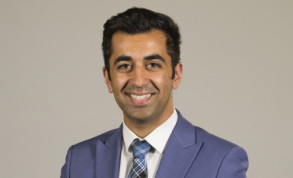NHS is main beneficiary of Scottish Budget that strengthens social contract
Unveiling the Scottish Budget, deputy first minister John Swinney said that the proposals, combined with past use of these powers, meant the government would raise about £1bn more next year than if it had followed UK tax decisions. Those earning more than £43,662 will pay an extra penny in income tax – moving to 42p in the pound. The top tax rate will also increase by 1p, with the threshold also lowered, mirroring the change announced by the UK government.
The funds are being specifically targeted at the NHS. ‘We have taken the decision to enable us to exceed the health resource Barnett consequentials from the UK government with substantial additional investment in the NHS, an investment that will benefit us all,’ he said. ‘It is, in short, an extra penny to enable spending on patient care in our NHS.’
The total health and social care budget will increase by more than £1bn – from £18bn to £19.2bn.
Health secretary, Humza Yousaf (pictured), said the ‘historic settlement’ required difficult decisions. ‘But we are steadfast in efforts to address the immediate pressures on health and social care services, and support fair work and pay,’ he said. ‘I want health and care services that are fit for the future – a future where Scotland continues to be the best place for health and care workers and where everyone gets the care that they need, where and when they need it.’
NHS boards (including national boards) will receive more than £13bn. A primary care fund will deliver £170m investment in multi-disciplinary teams and enable the development of community treatment and care services. A £1.7bn budget for social care and integration will ‘pave the way’ for the introduction of the national care service – with £100m to support the delivery of the £10.90 real living wage for adult social care.
The government said that mental health funding had almost doubled in cash terms since 2007 and that it would invest £290m over the coming year to tackle child and adolescent mental health services and psychological therapies, waiting times backlogs and deliver improved community-based mental health and wellbeing support for children, young people and adults.
Mr Swinney said the £1bn increase for health and social care compared with the £291m consequential funding for the NHS in Scotland that would have resulted from the UK autumn statement. The budget document also drew attention to this year’s £515m pay offer for NHS staff, which provides for an average increase of 7.5% and more than 11% for the lowest paid staff. Members of two unions have accepted the offer, which contrasts with the rest of the UK, where nurses are striking having rejected a lower pay offer.
Mr Swinney said that he was not publishing a public sector pay policy for 2023/24 at this stage.
The Institute for Fiscal Studies said that the funds raised by tax increases were small in the context of the government budget and cost pressures – for example, covering Scottish NHS spending for just 48 hours. The main reason for an improved funding outlook compared with a month ago was the extra funding announced in the UK government’s autumn statement.
And public services overall still face a tough period with funding set to fall by 1.6% in real terms next year compared to 2022/23. Given prioritisation for the NHS, this would imply big cuts for many service areas. ‘For some services outside the NHS these cuts will be substantial,’ said institute associate director David Phillips. ‘In the context of obvious pressures on many public services and disputes with public sector workers over pay, these plans may be hard to deliver.’
Related content
We are excited to bring you a fun packed Eastern Branch Conference in 2025 over three days.
This event is for those that will benefit from an overview of costing in the NHS or those new to costing and will cover why we cost and the processes.